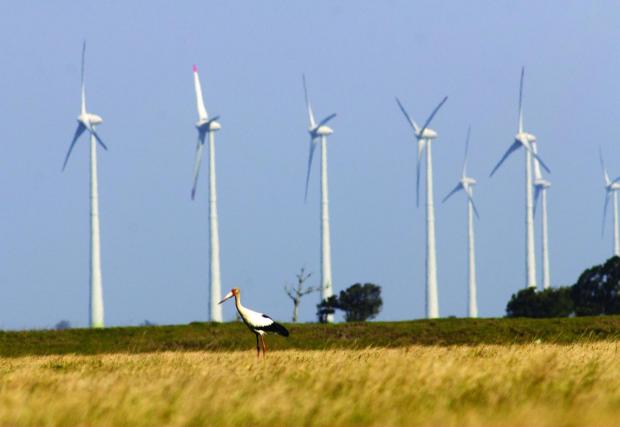Brazil’s Osorio wind farmBrazil to Invest $5.5 Billion in Renewable Energy Sources by 2013
By Antonio PasoliniThe Brazilian government earlier this month held a wind, hydroelectric and biomass auction that is expected to prompt US$ 5.52 billion in investments in renewable energies in Brazil. The resulting investments are expected to come primarily from private enterprise.
The auction, which contracted power from 89 wind farms, small hydroelectric plants and biomass plants, will add an installed capacity of 2,892.2 MW to the national energy matrix. Brazil's alternative energy auction was conducted through a process whereby the government first announced the energy demand stated by distributors to serve the market by 2013, and then electricity generators competed to provide energy to fill that demand at the lowest price.
The strategy resulted in a 5.17 percent decrease in the average trading price of energy supplied by small hydroelectric plants to US$ 83.57/MWh; a 17.41 percent decrease in energy supplied by biomass-fueled plants to US$ 78.42/MWh; and a 19.7 percent decline in energy from wind farms to US$ 76.25/MWh.
The contracts for energy to be supplied by small hydroelectric plants will run for 30 years, while those for biomass and wind generation will run for 20 years.
"The results of the energy auction represent a new paradigm in power generation in Brazil because they confirm it is possible to produce wind energy at a price that is competitive with those of thermal plants, which are more polluting," said Nelson Hübner, Director of Brazil's National Electricity Regulatory Agency (ANEEL).
According to Mauricio Tolmasquim, President of Brazil's Energy Research Company (EPE), Brazil's wind regime made it possible to purchase power at lower prices than in other regions of the world. "We have already hired the entire necessary capacity to supply the demand until 2014. The supply would be enough to enable Brazil to grow up to seven percent a year over the next four years," said Tolmasquim.
Brazil currently holds 65 percent of the installed potential for wind power generation in Latin America. The country currently maintains 45 wind farms, totaling 794 MW of power, or just 0.7 percent of the Brazilian energy supply mix. This energy can supply about 600,000 households or a city with threee million inhabitants. In December 2009, the Brazilian government held the first auction for wind energy, in which 71 projects and over 1,805 MW of installed wind capacity were contracted.
The Brazilian government will hold a similar auction in December 2010 aimed at meeting the national demand projection for 2015. The auction will be open to all generation sources, including alternative sources such as wind and biomass; small, medium and large-sized hydroelectric power plants; and natural-gas-fueled thermal plants.
Brazil's energy matrix is 48% renewable, thanks to its hydro power resources, which account for 80% of the total. At the COP15 last year, the country pledged to reduce about 37% of its carbon emissions by 2020. The pledge was written into law in the wake of the conference. Besides boosting renewable energy capabilities, Brazil is trying to curb deforestation, especially in the Amazon region, which is its major source of emissions.
Antonio Pasolini is a Brazilian writer and video art curator based in London, UK. He holds a BA in journalism and an MA in film and television.
Founder/Publisher/Editor: David McGee
Contributing Editors: Billy Altman, Laura Fissinger, Christopher Hill, Derk Richardson
Logo Design: John Mendelsohn (www.johnmendelsohn.com)
Website Design: Kieran McGee (www.kieranmcgee.com)
Staff Photographers: Audrey Harrod (Louisville, KY; www.flickr.com/audreyharrod), Alicia Zappier (New York)
E-mail: thebluegrassspecial@gmail.com
Mailing Address: David McGee, 201 W. 85 St.—5B, New York, NY 10024




